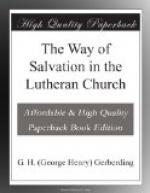We give to Sovereign Grace all the glory of our salvation just as much as the Calvinists do. And yet we make salvation as free as the boldest Arminian does. Whatever is excellent in both systems we retain. Whatever is false in both we reject. We refuse to make of man a machine, who is irresistibly brought into the kingdom of God, and forced indeed to accept of Sovereign Grace. On the other hand, we utterly repudiate the idea that man is himself able to “get religion,” to “get through,” to “grasp the blessing,” or to “save himself.” To such self-exaltation we give no place—no, not for a moment!
With Luther we confess, “I believe that I cannot, by my own reason or strength, believe in Jesus Christ my Lord, or come to Him. But that the Holy Spirit hath called me by His Gospel, enlightened me by His gifts, and sanctified and preserved me in the true faith; in like manner as He calls, gathers, enlightens, and sanctifies the whole Christian Church on earth, and preserves it in union with Jesus Christ in the true faith. In which Christian Church He daily forgives me abundantly all my sins and the sins of all believers, and will raise up me and all the dead at the last day, and will grant everlasting life to me and to all who believe in Christ. This is most certainly true.”
“Grace first contrived
the way
To save rebellious
man;
And all the steps
that Grace display
Which drew the
wondrous plan.
“Grace taught
my roving feet
To tread the heavenly
road;
And new supplies
each hour I meet,
While pressing
on to God.
“Grace all the work shall crown
Through everlasting days;
It lays in heaven the topmost stone,
And well deserves the praise.”
CHAPTER XXI.
JUSTIFICATION.
Among all the doctrines of our holy Christian faith, the doctrine of Justification by Faith alone, stands most prominent. Luther calls it: “The doctrine of a standing or a falling church,” i.e., as a church holds fast and appropriates this doctrine she remains pure and firm, and as she departs from it, she becomes corrupt and falls. This doctrine was the turning point of the Reformation in the sixteenth century. It was the experience of its necessity and efficacy that made Luther what he was, and equipped him for a Reformer. Naturally, therefore, it occupies the chief place in all our Confessions, and is prominent in all the history of our Church.
In these chapters on the “Way of Salvation,” it has been implied throughout. There is indeed no doctrine of salvation that is not more or less connected with or dependent on this one.




